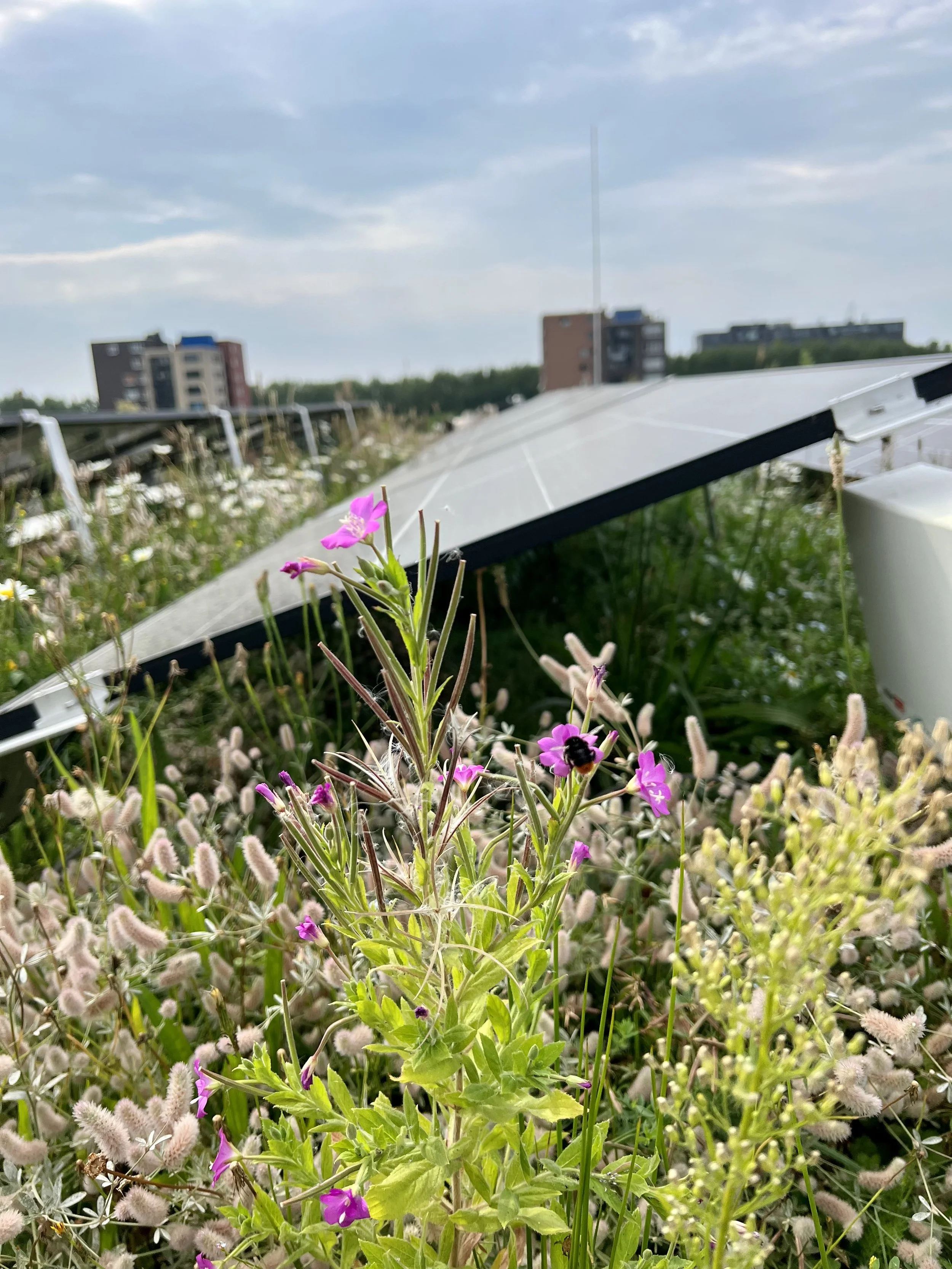Rooftop Farming Takes Hold in Downtown Houston
Advertisement
The Skyfarm with a view of downtown Houston, featuring a section of medicinal herbs and cilantro/coriander. Photo: Blackwood Educational Land Institute
Introduction
The Blackwood Skyfarm at POST Houston is gearing up to celebrate its third year of farm operations, which began officially in the spring of 2022. Blackwood Educational Land Institute, a nonprofit teaching farm based out of Hempstead, TX, is contracted with POST Houston to maintain this 1-acre rooftop farm until November of 2026. POST Houston, which was once the site of the historic Barbara Jordan Post Office, is a multi-use cultural center aimed towards connecting Houston’s communities. The farm is situated within an even larger rooftop garden, the Skylawn, which is the largest of its kind in Texas. Skylawn features a variety of ornamental plants native to this bioregion. Together, the Skylawn and Skyfarm have established the rooftop as an effective tool to mitigate stormwater issues and heat island effects. They also provide welcoming habitat to a variety of native wildlife, and serve as a popular space for visitors to connect with nature and urban agriculture.
Skyfarm Open Farm Day participants harvesting sage at sunset. Photo: Blackwood Educational Land Institute
The Skyfarm has opened a door to many new audiences for Blackwood due to its public-facing model and closer proximity to urban communities. Blackwood was established as a nonprofit focused on nature education in 2001 by Cath Conlon and enjoys a long history of providing educational programming at the 33-acre land farm. With the addition of the Skyfarm, we have been able to reach groups that otherwise would not have been able to come to Hempstead, the location of the land farm, and foster deeper relationships with them through our farming education programs. We are able to serve as an access point for local food systems, which furthers Blackwood’s mission to model regenerative farming and provide education around sustainable food systems.
Advertisement
Accessibility
One of the unique features of the Skyfarm is that we are accessible and open to the public seven days a week. The majority of our educational programming is free. We host Open Farm Days each Wednesday evening, in which lessons are centered around seasonal produce and tips for urban farming. We also have weekly volunteer days and schedule group tours and lessons or volunteer experiences from September to May. It is also important to us that people passing through the POST Houston rooftop space can connect with the farm, even if the farmer is not actively working in the field when they stop by. We have signs in the fields, labeling the plants and their benefits, culinary or medicinal uses. We also have QR codes linked to community lesson plans, culinary guides for the produce, and general information about farm operations.
Our nutrient rich soil as of Spring 2025 thanks to amendments such as composting and cover crops. Photo: Blackwood Educational Land Institute
As part of our goal to model a zero-mile food system, we also manage the Skyfarmers Market, which takes place at the POST Houston building every first and third Sunday of the month. We offer produce from the Skyfarm along with tips on how to use it in meals, or how to grow it at home. Produce that is not sold is routinely donated to local kitchens. Because of the market’s proximity to the farm, we are also able to give farm tours during the market. There is no better way, in our minds, to connect visitors with where their food comes from and how it is grown.
Soil Health and Ecological Corridor
Our soil was factory made and so much of the work on the farm relates to soil health and maintenance. Our farm has soil depth that ranges from 6 to 12 inches. Our farm staff follow a rigorous crop rotation schedule, integrated with cover crops and periods of rest. This is the second season that we have incorporated cover cropping into our farm plan. The benefits of cover crops include preventing wind based soil erosion, adding organic matter into the soil (which in turn enhances the farm’s resilience to drought or heavy rain), and sequester weed growth. Currently, we have a mix of all four families of cover crops: radish (brassicas), rye and barley (grass), sunn hemp, vetch, clover (legumes), and buckwheat and sunflower (annual broadleaf). Together, they are working to keep our soil intact and healthy.
Prior to working for Blackwood as our Lead Farmer at the Skyfarm, August Stubler was an urban beekeeper. August now manages the Skyfarm with particular consideration to the resources available for pollinators. (See Sustainable Futures podcast 22 with August) During the spring, summer, and fall, the Skyfarm hosts a wide variety of bees such as the Mountain Carpenter, Texas Leafcutter, and the Eucera long horned bees. Many of the sustainable practices upheld by the farm also benefit pollinators, such as seed collecting and minimal soil disturbance. We see the Skyfarm as an ecological corridor, supporting the wildlife within a certain radius of the POST Houston building. Since it is in the middle of downtown Houston, the Skyfarm provides a welcoming sanctuary for this wildlife in the midst of skyscrapers, parking lots, and the I-10 and 45 freeways that run next to the building. Throughout the spring and summer months, the farm is full of bees, butterflies, wasps, birds, and many other wonderful creatures that help us to make the Skyfarm the ecosystem that it is.
Advertisement
A Gulf Fritillary butterfly on some zinnias. Photo: Blackwood Educational Land Institute
Seed Saving and Crop Resiliency
The Skyfarm offers a year-round selection of medicinal herbs such as sage, lavender, rosemary, and thyme, as well as seasonal crops such as okra, cucumbers, cabbages, lettuces, strawberries, and onions. We also grow culturally relevant produce such as moringa (or drumstick plant), and roselle hibiscus (or flor de Jamaica). Moringa is native to southeast Asia and all parts of the tree are edible, from its bark to its flowers. It is considered a superfood because of the variety of its vitamins and antioxidants. Roselle is a favorite plant during the summer months because of its tolerance to heat and drought. It is used in a drink called aqua de Jamaica, or hibiscus tea. Because of the intense conditions of the site, on which temperatures can routinely reach 125 F in the summer, some plants that typically do well in Houston’s bioregion do not thrive well on the Skyfarm. As part of our dedication to a sustainable and regenerative approach to farming, we practice seed saving. This of course helps cut costs for us, helps support pollinators, and protects genetic variety. It also helps to ensure our future crops can withstand the specific conditions of our farm. In the summer of 2023, we had a severe drought, followed by a few destructive storms. Because of our plants’ tolerance to these extreme conditions that we faced the year prior, our farm was relatively unaffected by Hurricane Beryl which blew through in the summer of 2024.
A carpenter bee and honey bee sharing resources from a moringa tree. Photo: Blackwood Educational Land Institute
The Future of Rooftop Farming
August has just launched a farm apprenticeship program for those who are looking to deepen their knowledge and gain experience in urban farming, specifically on rooftops. Our assistant farmer, David Johnson, was previously working on a rooftop public school garden as their garden educator. We have also begun some consultations with other urban farmers looking to start their own rooftop farms. This work is both exciting and challenging and we hope the Skyfarm can serve as a sort of blueprint for future rooftop farms. Each rooftop farming experience will be vastly different from the next due to the construction of the fields or beds, depth of soil, microclimates, accessibility to water, and other design considerations. When talking about our journey, we share what has worked for us, but as growers know, it is a constantly evolving process. We are learning how to be flexible and pivot in response to the farm’s needs, which can change within each season, and every day.
Advertisement
Erin Satterwhite is the Director of Educational Programming at Blackwood Educational Land Institute. She creates educational workshops, tours, retreats, and other experiences for both farm locations. For information about Blackwood’s educational programming, please contact Erin at: erin@blackwoodland.org or visit: https://blackwoodland.org/
For more information see our podcast with August or visit: https://blackwoodsky.org/
POST Houston was recognized by Green Roofs for Healthy Cities with a Jeffrey L. Bruce Award of Excellence in 2024. In September of 2025 GRHC will be hosting a Grey to Green conference on the rooftop of POST Houston with Blackwood as our co-host. See www.greenroofs.org/events-2025









